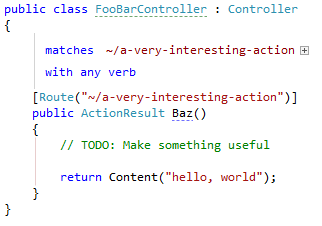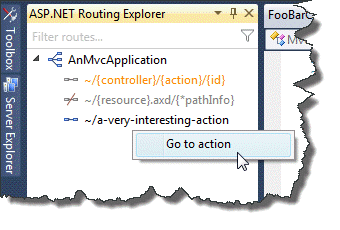MVC Extensions
An awesome routing engine for ASP.NET MVC 3 and 4
🤖
MVC Extensions has been discontinued, sorry
We have discontinued this product because newer ASP.NET versions already include a similar attribute-based routing mechanism.
Your first SEO route
Defining a route within the SEO routing model is easy, as all it takes is to decorate your target MVC action with the
Routeattribute, along with the URL you wish. The format of the URL resembles the one used by ASP.NET to identify a virtual path, so the tilde symbol (
~) may be used as a placeholder for the root directory.
In the following block of code, for example, a SEO route with the URL
~/a-very-interesting-actionis defined for the MVC action:
public class FooBarController : Controller
{
[Route.Action("~/a-very-interesting-action")]
public ActionResult Baz()
{
// TODO: Make something useful
return Content("hello, world");
}
}
Application (Global.asax) setup
Before trying to execute the sample action by navigating to the aforementioned URL, however, you should add a one-time call to the
DeclarativeRouteRegistration. RegisterRoutes()static method from the application instance class for your web application (Global.asax / Global.asax.cs), in order to properly configure the ASP.NET runtime and setup the SEO routing model.
The setup code should be executed during the startup phase of the application and, by convention, should be placed at the top of the
standard
In addition to that, SEO Extensions also requires you to configure your runtime license key before using the SEO routing model; for this you should set the
RegisterRoutes()method, before any other eventual routes definitions; SEO routes can coexist with other, non-SEO routes: just consider that the ASP.NET engine will process routes according to the order of their definitions.
In addition to that, SEO Extensions also requires you to configure your runtime license key before using the SEO routing model; for this you should set the
DeclarativeRouteRegistration. RuntimeLicenseKeystatic property equals to the value available in the Clients area.
The following example shows how parts of your Global.asax.cs could look like after the setup code addition:
public class MyApplication : System.Web.HttpApplication
{
// ...
public static void RegisterRoutes(RouteCollection routes)
{
// SEO routing model registration
DeclarativeRouteRegistration.RegisterRoutes();
// Standard ASP.NET routes
routes.IgnoreRoute("{resource}.axd/{*pathInfo}");
routes.MapRoute(
"Default", // Route name
"{controller}/{action}/{id}", // URL with parameters
new
{
controller = "Home",
action = "Index",
id = UrlParameter.Optional
}
);
}
// ...
protected void Application_Start()
{
// Setup the runtime license key for Cobisi SEO Extensions
DeclarativeRouteRegistration.RuntimeLicenseKey = "...";
// ...
RegisterRoutes(RouteTable.Routes);
// ...
}
// ...
}
Visual feedback in the IDE
As soon as you decorate your MVC action with the
Routeattribute, Cobisi SEO Extensions shows a visual feedback directly in the IDE, in order to highlight the search-engine optimized route you have defined.

In addition to that, the routes defined by the web application will be listed in the ASP.NET Routing Explorer tool window; clicking on
the ones defined by way of the Route attribute will directly lead to the related MVC action method.

Content
Not what you are looking for?
Please don't hesitate to contact us with your questions and comments; technical support is always
free of charge, and requests made by registered clients will have higher priority.